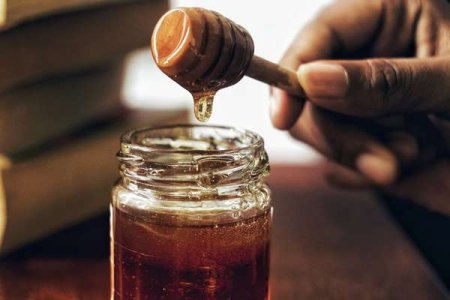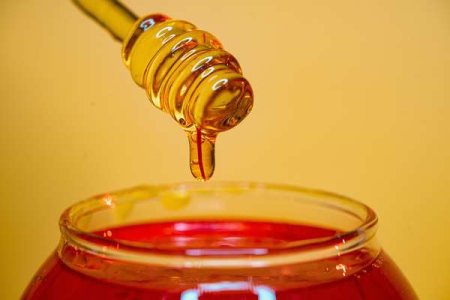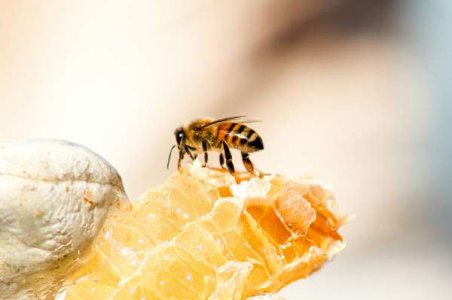What’s really in your basket? The truth behind a trending grocery favorite
- Replies 0
From kitchen cabinets to wellness trends, one common staple has become a symbol of healthy living.
You might think you’re making a healthy choice, but that pantry favorite may not be what it claims. New warnings suggest the truth may be a little stickier than we thought.
Here’s what you need to know before you reach for it again. Let’s take a closer look together, shall we?
Honey's reputation as a healthful sweetener is well-deserved, but only when it's the real deal. It’s often recognized as a superfood because of its antioxidant properties, but not all types of honey are created equal or have the same health benefits.
The problem is that much of the honey lining supermarket shelves is not what it seems.
There are so many honey options available out there, with stores selling countless varieties. Some honeys are even labeled based on the type of plant the bees creating the honey have pollinated, like wildflower honey or buckwheat honey.
Experts are sounding the alarm on “fake” honey—a diluted version that's a shadow of the nutrient-rich nectar produced by honeybees.

Fabián Torres, director of business development at SICPA and honey expert, cautions against these “fake” honey or diluted imitations, which can spike blood sugar levels and lack the beneficial properties of pure honey.
The issue is so prevalent that Ferhat Ozturk, a professor and honey researcher, found that honey from local beekeepers is significantly more biologically active than the varieties found in most grocery stores. This comes after analyzing honey samples.
Honey’s effectiveness as a natural remedy is influenced by several factors, including its antibacterial, antioxidant, and antimicrobial qualities.
These traits contribute to what researchers call its biological activity level—an important measure of its medicinal potential, according to Ozturk.
“About one-third of honeys in the international trade market are fraud or adulterated,” he added.
What makes some store-bought honey a poor choice for your health?
It's often diluted with additional sweeteners like high fructose corn syrup or rice syrup. This not only compromises the taste but also waters down the antioxidants and polyphenols that make honey a superfood.
Beth Czerwony, an outpatient dietitian, warns that these diluted products are cheaper to produce and can fool consumers with their sweetness.

“Manufacturers will end up diluting down honey,” she told Newsweek. “So it’s a cheaper product, and when you taste the sweetness, you get fooled.”
She explained that this is often done using additives like high fructose corn syrup or rice syrup—though these ingredients aren’t always listed on the label.
By watering down the honey, producers also strip away many of its health benefits. “You’re not getting the full concentration of those antioxidants and polyphenols that you get from raw honey,” Czerwony said.
For those looking to maximize the nutritional value, she recommended skipping the mass-produced brands and instead buying honey from a local beekeeper or farmer’s market.
Raw vs. Pure: Decoding Honey Labels
Understanding honey labels is key to making an informed purchase.
Raw honey is simply strained from the honeycomb and bottled, retaining its natural nutrients and enzymes.
It's unpasteurized, which means it's not recommended for children under three but is generally safe for adults.
Pure honey, on the other hand, should contain no additives. However, regular honey can be a mixed bag, potentially including flavorings, extra sugars, or water.

How to Spot the Fakes
The clearest sign that honey may be diluted is often its price point, according to Beth Czerwony. “The lighter honey, I would suspect, is diluted down,” she said, noting that pure honey tends to be darker and more amber in color.
Another key indicator of authentic honey is crystallization. Because pure honey has low water content, it may begin to crystallize over time — a natural process that actually suggests it hasn’t been watered down.
For those seeking honey with real health benefits, local sources are the way to go.
“The best way to find honey with health benefits is to purchase it from a local beekeeper,” said honey expert Dr. Ozturk. He added that the darker the honey, the higher its biological activity and medicinal value.
“If you really need to buy honey for medicinal reasons, grocery store honeys should be avoided,” Ozturk advised. “Most of the time those are either heated or they are processed.”
If you must shop at a grocery store, he recommends looking for dark, local, and natural honey—often found at organic markets. “Those honeys will be preferable over light-colored honeys,” he said.
Honey that’s been diluted with additives like corn syrup or rice syrup won’t offer the same health benefits as the real deal.
“If you're looking at it as a sweetener, it may not bother you,” said dietitian Beth Czerwony. “But if you're looking for actual anti-inflammatory properties, make sure you're diligent about having pure honey.”
Source: Whole Shenanigans / Youtube.
Even when it’s raw and unprocessed, honey is still a form of concentrated sugar, Czerwony warned.
“Don’t have tons of it throughout the day,” she added. “It has calories, and it can affect blood sugar negatively. Two to three tablespoons is what we say is the maximum based on the amount of sugar.”
What You Can Do
To reap the health benefits of honey, consider buying from farmer's markets or directly from local beekeepers.
Not only will you be getting a superior product, but you'll also be supporting local agriculture.

Have you ever been disappointed by a honey purchase? Do you have tips for finding the best quality honey? Share your experiences and advice in the comments below!
You might think you’re making a healthy choice, but that pantry favorite may not be what it claims. New warnings suggest the truth may be a little stickier than we thought.
Here’s what you need to know before you reach for it again. Let’s take a closer look together, shall we?
Honey's reputation as a healthful sweetener is well-deserved, but only when it's the real deal. It’s often recognized as a superfood because of its antioxidant properties, but not all types of honey are created equal or have the same health benefits.
The problem is that much of the honey lining supermarket shelves is not what it seems.
There are so many honey options available out there, with stores selling countless varieties. Some honeys are even labeled based on the type of plant the bees creating the honey have pollinated, like wildflower honey or buckwheat honey.
Experts are sounding the alarm on “fake” honey—a diluted version that's a shadow of the nutrient-rich nectar produced by honeybees.

Experts warn that not all honey is created equal, with some store-bought honeys being diluted and lacking the health benefits of pure honey. Image source: Arwin Neil Baichoo / Unsplash.
Fabián Torres, director of business development at SICPA and honey expert, cautions against these “fake” honey or diluted imitations, which can spike blood sugar levels and lack the beneficial properties of pure honey.
The issue is so prevalent that Ferhat Ozturk, a professor and honey researcher, found that honey from local beekeepers is significantly more biologically active than the varieties found in most grocery stores. This comes after analyzing honey samples.
Honey’s effectiveness as a natural remedy is influenced by several factors, including its antibacterial, antioxidant, and antimicrobial qualities.
These traits contribute to what researchers call its biological activity level—an important measure of its medicinal potential, according to Ozturk.
“About one-third of honeys in the international trade market are fraud or adulterated,” he added.
What makes some store-bought honey a poor choice for your health?
It's often diluted with additional sweeteners like high fructose corn syrup or rice syrup. This not only compromises the taste but also waters down the antioxidants and polyphenols that make honey a superfood.
Beth Czerwony, an outpatient dietitian, warns that these diluted products are cheaper to produce and can fool consumers with their sweetness.

Pure, biologically active honey, which is often found at farmers' markets or from local beekeepers, has medicinal potential due to its higher levels of antibacterial, antioxidant, and antimicrobial properties. Image source: Benyamin Bohlouli / Unsplash.
“Manufacturers will end up diluting down honey,” she told Newsweek. “So it’s a cheaper product, and when you taste the sweetness, you get fooled.”
She explained that this is often done using additives like high fructose corn syrup or rice syrup—though these ingredients aren’t always listed on the label.
By watering down the honey, producers also strip away many of its health benefits. “You’re not getting the full concentration of those antioxidants and polyphenols that you get from raw honey,” Czerwony said.
For those looking to maximize the nutritional value, she recommended skipping the mass-produced brands and instead buying honey from a local beekeeper or farmer’s market.
Raw vs. Pure: Decoding Honey Labels
Understanding honey labels is key to making an informed purchase.
Raw honey is simply strained from the honeycomb and bottled, retaining its natural nutrients and enzymes.
It's unpasteurized, which means it's not recommended for children under three but is generally safe for adults.
Pure honey, on the other hand, should contain no additives. However, regular honey can be a mixed bag, potentially including flavorings, extra sugars, or water.

Consumers are advised to be cautious when purchasing honey from grocery stores as it may be adulterated with syrups and not provide the health benefits associated with raw or pure honey. Image source: Meggyn Pomerleau / Unsplash.
How to Spot the Fakes
The clearest sign that honey may be diluted is often its price point, according to Beth Czerwony. “The lighter honey, I would suspect, is diluted down,” she said, noting that pure honey tends to be darker and more amber in color.
Another key indicator of authentic honey is crystallization. Because pure honey has low water content, it may begin to crystallize over time — a natural process that actually suggests it hasn’t been watered down.
For those seeking honey with real health benefits, local sources are the way to go.
“The best way to find honey with health benefits is to purchase it from a local beekeeper,” said honey expert Dr. Ozturk. He added that the darker the honey, the higher its biological activity and medicinal value.
“If you really need to buy honey for medicinal reasons, grocery store honeys should be avoided,” Ozturk advised. “Most of the time those are either heated or they are processed.”
If you must shop at a grocery store, he recommends looking for dark, local, and natural honey—often found at organic markets. “Those honeys will be preferable over light-colored honeys,” he said.
Honey that’s been diluted with additives like corn syrup or rice syrup won’t offer the same health benefits as the real deal.
“If you're looking at it as a sweetener, it may not bother you,” said dietitian Beth Czerwony. “But if you're looking for actual anti-inflammatory properties, make sure you're diligent about having pure honey.”
Source: Whole Shenanigans / Youtube.
Even when it’s raw and unprocessed, honey is still a form of concentrated sugar, Czerwony warned.
“Don’t have tons of it throughout the day,” she added. “It has calories, and it can affect blood sugar negatively. Two to three tablespoons is what we say is the maximum based on the amount of sugar.”
What You Can Do
To reap the health benefits of honey, consider buying from farmer's markets or directly from local beekeepers.
Not only will you be getting a superior product, but you'll also be supporting local agriculture.
Key Takeaways
- Experts warn that not all honey is created equal, with some store-bought honeys being diluted and lacking the health benefits of pure honey.
- Pure, biologically active honey, which is often found at farmers' markets or from local beekeepers, has medicinal potential due to its higher levels of antibacterial, antioxidant, and antimicrobial properties.
- Consumers are advised to be cautious when purchasing honey from grocery stores as it may be adulterated with syrups and not provide the health benefits associated with raw or pure honey.
- It is recommended to buy dark, local, and natural honey from trusted sources to ensure the honey's health benefits, especially if used for medicinal purposes, and to be mindful of consumption because honey is still a form of concentrated sugar.
Have you ever been disappointed by a honey purchase? Do you have tips for finding the best quality honey? Share your experiences and advice in the comments below!






